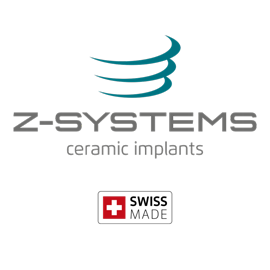Titanium dental implants have long been the best solution for replacing missing or failing teeth.
They restore health and confidence, prevent bone loss and look and act just like real teeth. The positive impact they've had and the lives they've changed around the world has been truly amazing.
But as Michael Eisner once said, "There is no good idea that cannot be improved upon," and in the dental implant world, that meant asking 3 questions:
1. How can we fix the appearance issues that currently exist with titanium implants?
2. How can we create a stronger design to decrease the instance of implant failure?
3. With the growing health concerns around metal in dentistry, how can we create a more health conscious product?
These 3 questions led to one of the industry's most important innovations: The Ceramic Implant.
Appearance
Although titanium implants are made to look just like your natural teeth, there are still aesthetic issues they carry with them. Because titanium implants are made from dark gray metal, for those with thin gums, this metal can actually show through your gums, giving them an unnatural, dark gray look. In addition, for those whose gums begin to recede, the metal implant can actually begin to be exposed just above your tooth. That's obviously not a look you want.
So how can we make implants look more natural?
Forget the gray metal and make them a beautiful, ceramic white. The all white ceramic implant will always be undetectable because it's the color of your natural teeth. Problem solved.
Strength of Design
Titanium implants have 2 metal components: the implant and the abutment. When pressure is applied to the implant, by chewing for example, bacteria can get lodged in between the implant pieces. Your mouth is unfortunately the perfect environment for that bacteria to grow and as it grows, it emits toxins that can cause gum inflammation and bone loss. And all of this can lead to the result that we really don't want - implant failure.
So how can the design be improved and the risk of failure decreased?
By creating a one-piece design made of bio-compatible zirconia (ceramics)! A one piece ceramic design eliminates the risk of bacteria being introduced into the implant, which means it can’t cause that gum inflammation or bone loss and ultimately decreases the chance of implant failure.
Bio-compatibility
Titanium, like any other metal, is subject to corrosion. The moment a titanium implant is placed into your mouth, it begins to decay. This causes micro titanium particles to move from the implant to your surrounding gum tissues and even into your lymph nodes. These titanium particles in your bloodstream can cause a myriad of health issues and vary in severity depending on how sensitive your body is to metal.
So how can we prevent the implant from decaying?
By using a material that's non corrosive, bio-compatible and bio-inert. Because zirconia is all of these things it won't decay, which means it will never trigger chemical reactions, migrate to other sites in your body or interfere with your overall health.
Reaction to electromagnetic fields
It's well known that metal reacts strongly to electric current. Titanium implants are no different. They expose your mouth to a consistent electromagnetic field that can create a host of health issues for the rest of your body.
Dr. Lina Garcia, from The International Academy of Biological Dentistry & Medicine, has witnessed many of these health hazards. She elaborates, “Titanium implants, particularly when combined with other ‘toxic teeth’ that make up what I call a ‘dirty mouth,’ are causing sleep disturbances, anxiety and other neurological problems, thyroid dysfunction, digestive problems, heart problems, and other chronic symptoms in a number of my patients.â€
How can implants be made to be non conductive?
Make them metal-free! Since ceramic implants are metal-free and react in no way to electromagnetic fields, this health implication is taken off the table.
Metal allergies
The final health issue affects those with metal allergies.
Metal allergies commonly come on in the form of oral dryness, facial swelling, loss of taste or a burning sensation in the mouth. They can cause a variety of long term reactions, including dental implant failure and more serious issues like swelling of the upper respiratory tract.
How can we make implants safe for everyone, even those with metal allergies?
Ceramic implants are metal-free and hypollargenic, so those with metal allergies can safely live with ceramic implants and have no allergic reactions.
Z-SYSTEMS
If you have failing or missing teeth, dental implants are generally always a good idea, but ceramic implants are an even better idea.
Please visit our website to find out more about our beautiful, white ceramic implants and to find a Z-practice provider near you.
Z-SYSTEMS - Where Health Meets Beauty.
Like our Facebook page to get all of our latest news, first.
Sources:
https://www.ncbi.nlm.nih.gov/pmc/articles/PMC3753052/
https://www.dental-tribune.com/news/ceramic-implants-what-benefits-do-they-offer/






